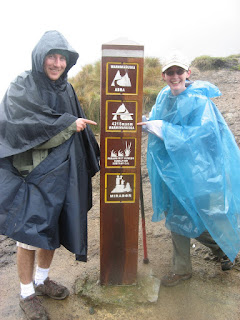Peace Corps Volunteers and Fullbright Scholars in Bolivia have been asked by a US Embassy Representative to spy on Cuban and Venezuelan nationals.
See here and
here. A huuuuuuuuuuuge breach of protocol (to ask such a thing) any compliance with the request has been denied as both PCVs and Fullbrights are specifically apolitical. The US Embassy has also acknowledged the error as such.
Cuban and Venezuelan nationals are in Bolivia to enact various social programs in the country´s ongoing socialist, um, consolidation. (ie we´re rolling with the socialist homies and they´re paying for stuff.) In my own town we have Cuban doctors which guarantees good music playing in the bar for at least a few months and Venezuela has funded quite a few construction projects. We also had, for a time, a tall leggy Venezuelan number doing literacy programs. I didn´t have much interaction with her because I only understood about 4% of the words coming out of her mouth.
This, by the way, could get Peace Corps kicked out of the country.
-----------
Peace Corps´official statement is linked to the link above. but if you care for it in Spanish (por si a caso) aqui está:
DECLARACION DE CUERPO DE PAZ
Desde su inicio en 1961, Cuerpo de Paz, ha mantenido el firme mandato que sus voluntarios se mantengan al margen de cualquier actividad oficial correspondiente a la política extranjera de los Estados Unidos, lo que incluye el involucrarse en actividades de inteligencia. Este mandato ha sido reforzado constantemente por todas las autoridades de Cuerpo de Paz desde hace más de 46 años.
Cualquier conexión entre el Cuerpo de Paz y la comunidad de Inteligencia comprometería seriamente la capacidad de Cuerpo de Paz de desarrollar y conservar la confianza de la gente del país en el que el voluntario presta sus servicios.
Consistente con la política de cada una de las administraciones de Cuerpo de Paz desde 1961, el Director Ron Tschetter, quien es un ex voluntario que hizo su servicio en la India (1966-1968), ha sido explícitamente claro en reafirmar esta antigua política y, una vez mas, asegurar que el objetivo de los voluntarios de Cuerpo de Paz es trabajar en el servicio a la comunidad, solamente.
La política de Cuerpo de Paz en contra de las conexiones de inteligencia, se basa en la autoridad general del Director Mundial de Cuerpo de Paz, provista en la sección 5 (a) del Acta de Cuerpo de Paz, de establecer términos y condiciones de servicio a los voluntarios, y por el Acta de Servicio Extranjero de 1980, y la antigua y siempre vigente política de la Agencia de prohibir cualquier conexión entre Cuerpo de Paz y la actividad de Inteligencia anunciada por primera vez durante la Gestión del Primer Director de Cuerpo de Paz, Sargent Shriver en 1961.
Desde la apertura del programa de Cuerpo de Paz en 1962, más de 2500 Voluntarios norte-americanos han servido en Bolivia. Después de un receso que comenzó en 1971, el gobierno de Bolivia formalmente solicito a los Estados Unidos que este retorne a Bolivia, y por lo tanto, el Cuerpo de Paz re asumió sus operaciones en 1990. Hoy, 130 voluntarios están trabajando en Bolivia en las áreas de agricultura, desarrollo de microempresas, educación, saneamiento básico y proyectos de medio ambiente. En los lugares que así lo requieren, Cuerpo de Paz también integra a voluntarios capacitados en informática y tecnología para expandir el acceso a la tecnología entre la juventud boliviana, agricultores, micro empresarios y municipalidades.
La seguridad de los Voluntarios sigue siendo nuestra primera prioridad. Debido al ambiente en que se trabaja, el Cuerpo de Paz basa su seguridad en minimizar los riesgos a una mínima expresión e incrementa la seguridad proveyéndoles una experiencia significada a los voluntarios y a sus familias anfitrionas. El Cuerpo de Paz esta celebrando sus 46 anos de servicio en la casa y fuera de ella. Actualmente hay más de 8000 voluntarios haciendo su servicio, 37 años en el campo. Desde 1961, más de 190.000 voluntarios han colaborado en promover un mejor entendimiento entre los norteamericanos y la gente de 139 países donde los voluntarios han servido. Para ser voluntario de Cuerpo de Paz, se requiere ser de ciudadanía norte-americana y tener al menos 18 años de edad. El servicio de Cuerpo de Paz es un compromiso de 27 meses.
#########
Amanda H. Beck
Directora de Prensa
Cuerpo de Paz
 The view outside town!
The view outside town! My favorite English student and her kidlet at graduation!
My favorite English student and her kidlet at graduation! Shimu and I at the high point (literally) of the Inca Trail!
Shimu and I at the high point (literally) of the Inca Trail! Macchu Picchu!
Macchu Picchu!


 Shimon went back to La Paz and the states Saturday night and due to a lack of buses leaving directly for Tarija, I left for Potosí on Sunday afternoon. Unfortunately I missed my connecting bus and due to an overwhelming urge to sleep in my own bed and see my kitten I paid an arm and a leg to take a very bumpy 4hour taxi ride home.
Shimon went back to La Paz and the states Saturday night and due to a lack of buses leaving directly for Tarija, I left for Potosí on Sunday afternoon. Unfortunately I missed my connecting bus and due to an overwhelming urge to sleep in my own bed and see my kitten I paid an arm and a leg to take a very bumpy 4hour taxi ride home.